Overview
The article emphasizes the essential tasks required for goal completion, highlighting the critical role of systematic approaches like automation, SMART objectives, progress tracking, and effective communication. It details how tools such as Casy can significantly streamline task management, enhance collaboration, and ensure that necessary activities are consistently identified and executed. This ultimately drives teams towards successful goal achievement.
Are you ready to elevate your team's performance? With Casy, you can transform your approach to goal completion and unlock your startup's full potential.
Introduction
In the fast-paced realm of project management, the successful execution of essential tasks is crucial for achieving goals. The emergence of automation tools like Casy empowers teams to streamline their workflows, converting discussions into actionable items that drive goal completion. Yet, amidst this technological advancement lies a significant challenge: how can teams effectively prioritize and manage these necessary activities to ensure success? This article delves into nine critical tasks that not only boost productivity but also equip teams to navigate the complexities of goal achievement with confidence.
Casy: Automate Task Management for Goal Achievement
Casy operates as an invisible project manager, seamlessly integrating with chat platforms like Slack and Telegram. It automatically captures key information from conversations, transforming discussions into actionable tasks, which are required activities that need to take place in order to complete a goal, while also setting deadlines and updating documents—all without manual input. This automation drastically reduces administrative overhead, allowing teams to concentrate on their core activities and enhance productivity. As a result, teams can achieve their objectives more effectively while minimizing the risk of miscommunication.
The impact of such automated management tools in 2025 is profound, as they streamline workflows and empower teams to function with greater efficiency. Professional insights, including those from Joy Gumz, emphasize that managing initiatives involves tasks that are required activities that need to take place in order to complete a goal, which is vital for achieving operational and strategic objectives. Tools like Casy not only facilitate smoother task execution but also foster a more collaborative environment.
Moreover, with generative AI projected to contribute up to $4.4 trillion in productivity annually, the benefits of utilizing Casy become increasingly evident. Its support for unlimited teams and tasks, coupled with methodologies like OKRs, positions it as a distinctive solution for modern management challenges. Are you ready to revolutionize your team's productivity with Casy?
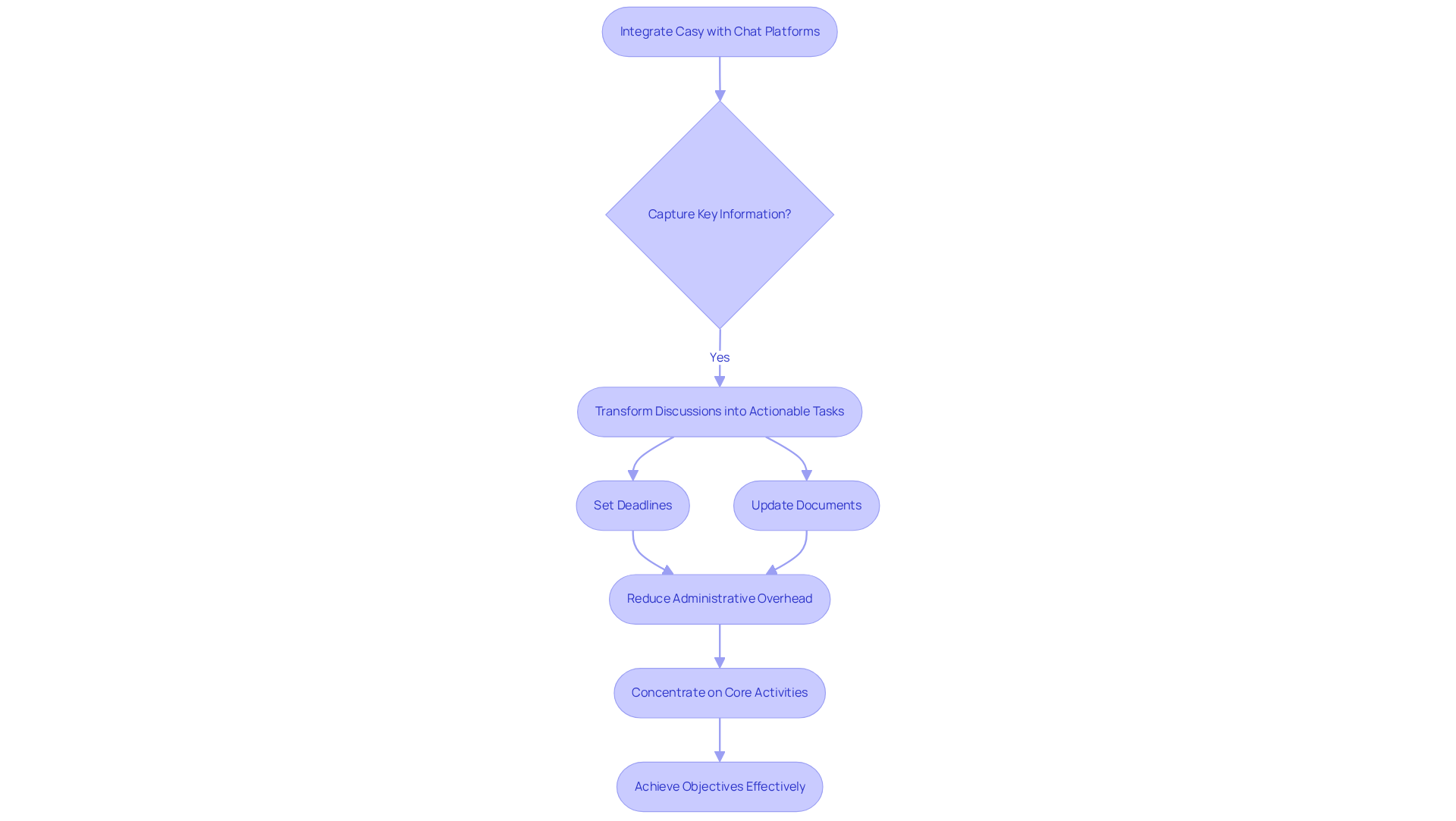
SMART Goals: Define Clear Objectives for Success
Establishing SMART objectives is essential for effective project management, particularly for startups aiming to optimize operations. Each objective must be Specific, Measurable, Achievable, Relevant, and Time-bound. For example, rather than a vague aim like 'increase sales,' a SMART target would specify 'increase sales by 20% in the next quarter through a focused marketing campaign.' This clarity not only helps teams understand their objectives but also aligns their efforts toward measurable outcomes.
Studies indicate that approximately 70% of teams adopting SMART objectives report improved performance and focus. Successful applications of SMART objectives in project management include goals such as:
- Reducing project completion time from three minutes to one minute by the end of the upcoming quarter
- Enhancing customer satisfaction ratings by 10% in the next quarter
These objectives provide a clear framework for tracking progress and making necessary adjustments, acknowledging that tasks are required activities that need to take place in order to complete a goal.
Project management professionals assert that defining clear objectives is critical for success. As Hudson Outsourcing states, 'Particular objectives offer clarity and direction, facilitating your group's comprehension of what must be achieved and how to reach it.' As we approach 2025, the importance of SMART objectives will only grow, enabling adaptability and responsiveness in a rapidly changing business environment. To set SMART objectives effectively, teams should engage in collaborative discussions, ensuring that each target aligns with broader business goals and that all members understand their roles in achieving these aims. Regularly reviewing and adjusting tasks are required activities that need to take place in order to complete a goal, which is vital to navigate unexpected challenges throughout the year.
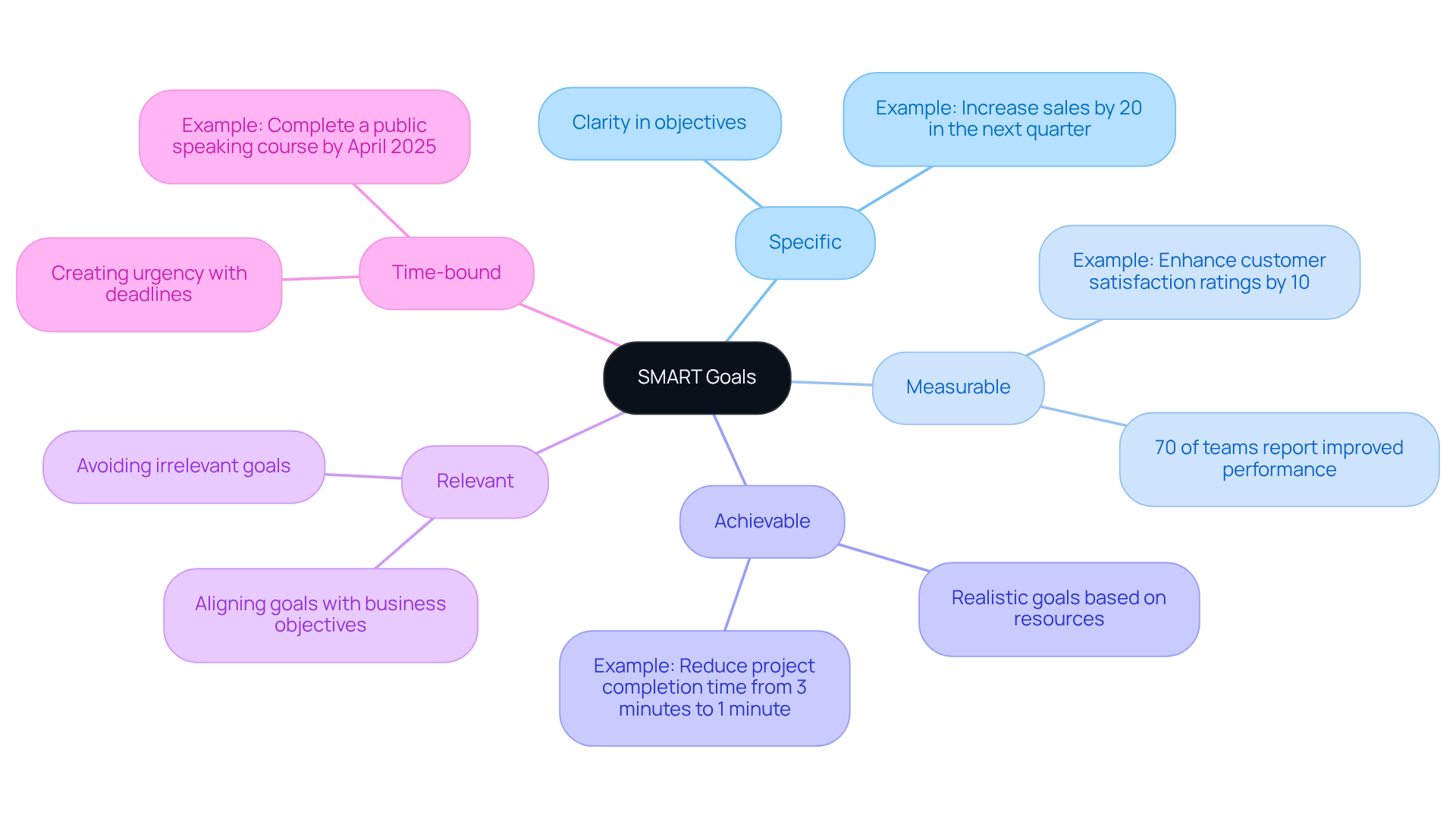
Progress Tracking: Monitor Milestones to Stay on Course
Progress monitoring is essential for effective management, as it involves establishing milestones that act as checkpoints throughout the lifecycle of any endeavor, ensuring that tasks are required activities that need to take place in order to complete a goal. By frequently assessing these milestones, teams can evaluate their progress and understand that tasks are required activities that need to take place in order to complete a goal, allowing them to make informed adjustments as necessary. Research indicates that tasks are required activities that need to take place in order to complete a goal, and projects with clearly defined milestones tend to outperform others. However, the claim of a 20% increase in on-time delivery rates must be substantiated by credible sources.
Tools like Casy automate this process, providing real-time updates and insights into project status, which empowers teams to remain focused and agile. Casy's unique capability to capture key information from conversations and automatically create tasks, which are required activities that need to take place in order to complete a goal, significantly boosts its effectiveness in milestone tracking. By leveraging such tools, startups can ensure that tasks are required activities that need to take place in order to complete a goal, thereby enhancing their adaptability and responsiveness.
As industry leaders highlight, effective milestone monitoring involves tasks that are required activities that need to take place in order to complete a goal, fostering accountability and cultivating a culture of continuous improvement. This practice is vital for any organization aspiring to achieve success. To maximize the benefits of milestone tracking, teams should consider implementing regular review intervals and utilizing automation tools like Casy to streamline their processes. Are you ready to elevate your project management strategy?
![]()
Task Prioritization: Focus on High-Impact Activities
Effective prioritization of responsibilities is essential for maximizing productivity among groups. By classifying tasks as required activities that need to take place in order to complete a goal according to urgency and significance, teams can concentrate on high-impact efforts that propel them toward their objectives. The Eisenhower Matrix, a proven approach for managing responsibilities, clarifies priorities by dividing activities into four quadrants:
- Urgent and important
- Important but not urgent
- Urgent but not important
- Neither urgent nor important
This structured method ensures that tasks are required activities that need to take place in order to complete a goal, thus mitigating decision fatigue while keeping strategic objectives in focus.
For startups, implementing the Eisenhower Matrix can yield significant time savings and enhanced productivity. Consider Quadrant 1: activities that demand immediate attention, such as meeting tight deadlines or addressing urgent client requests. In contrast, Quadrant 2 highlights significant activities that are not urgent, like planning for future projects or professional growth, which should be scheduled for later.
Moreover, color-coding tasks within the matrix—green for high priority, yellow for medium, blue for low, and red for non-priority—can further streamline the prioritization process. This visual tool allows groups to swiftly assess what requires prompt attention and what can be delegated or eliminated, promoting a more effective workflow.
As Abraham Lincoln wisely noted, 'Give me six hours to chop down a tree and I will spend the first four sharpening the axe.' This underscores the importance of preparation and prioritization in achieving success. Additionally, it is noteworthy that 60% of our time at work is spent on work about work, such as sharing status approvals or following up on information. By utilizing the Eisenhower Matrix, groups can reclaim their time, reduce stress, and focus on tasks that are required activities that need to take place in order to complete a goal, ultimately driving progress toward their goals.
Team Communication: Foster Collaboration for Better Outcomes
Encouraging open and effective communication among groups is vital for successful collaboration. Regular check-ins, updates, and feedback loops are essential strategies that ensure all group members remain aligned and informed. Research indicates that companies promoting collaborative work are five times more likely to achieve high performance, underscoring the significance of a supportive communication environment.
How can your team harness this potential? Casy enhances this dynamic by automatically capturing key discussions from chat platforms and transforming them into actionable tasks. This automation not only keeps group members informed but also actively involves them in the initiative.
Studies indicate that participants working together are more motivated and persistent in addressing challenges. By simplifying communication processes and tackling issues such as manual updates and ongoing coordination requirements, Casy enables groups to concentrate on their essential tasks, which are required activities that need to take place in order to complete a goal. This ultimately results in enhanced project outcomes and increased overall productivity.
Are you ready to elevate your team's collaboration?
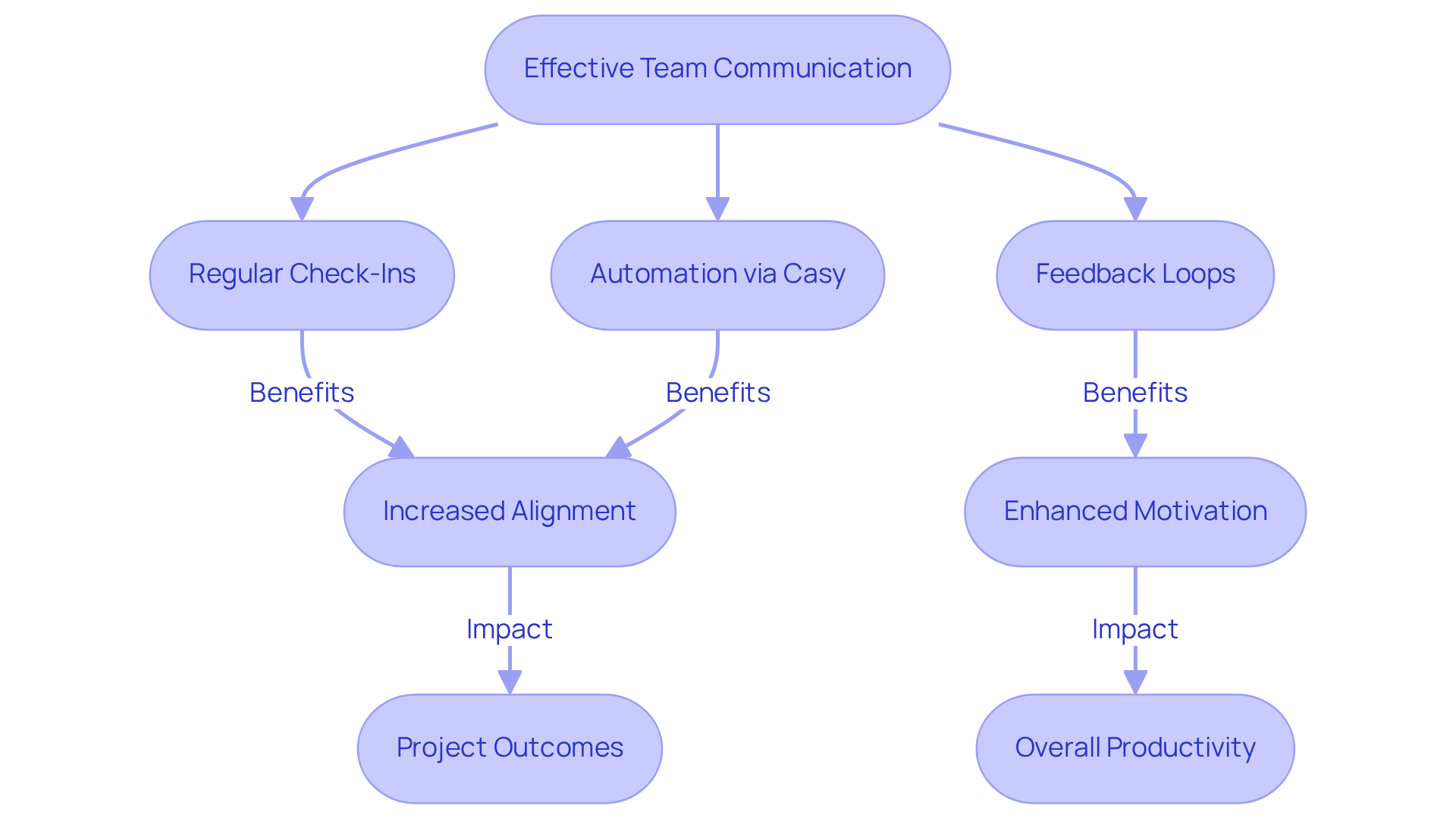
Agile Methodology: Adapt Quickly to Changing Needs
Embracing an agile methodology enables groups to swiftly adapt to changing requirements and shifting priorities. By working in iterative cycles, teams can continually enhance their processes and outputs, significantly improving their responsiveness to change. This flexibility is particularly advantageous in dynamic sectors such as game development and marketing, where rapid adjustments are often essential.
Recent statistics indicate that agile adoption among software development groups surged from 37% to 86% between 2020 and 2021, reflecting a growing recognition of its benefits. Notably, agile practices boast a mere 3% failure rate in projects compared to traditional methods, underscoring their effectiveness.
Casy promotes agile methods by allowing teams to adjust assignments and priorities in real-time, ensuring alignment with objectives and market demands. This adaptability not only boosts project success rates but also cultivates a culture of innovation and resilience—critical for startups navigating competitive landscapes.
To fully leverage agile methodologies, startup founders should consider implementing leadership competencies and actively engaging stakeholders in their agile transformations.
Delegation: Empower Team Members to Take Ownership
Efficient delegation is crucial for enhancing group performance, as it involves assigning responsibilities based on individual strengths and expertise. This approach not only balances the workload but also empowers group members to take ownership of their tasks. Have you considered how automating role assignments with Casy can clarify responsibilities and expectations? This not only significantly improves accountability but also drives results. Research from the American Psychological Association reveals that organizations promoting effective delegation can experience productivity increases of up to 30%. Furthermore, groups that practice delegation report a 25% rise in job satisfaction, according to a Gallup study, fostering a more engaged and motivated workforce.
For instance, a technology startup that implemented organized delegation procedures witnessed a 30% boost in employee morale and a 40% reduction in turnaround time. This illustrates the tangible benefits of empowering team members through efficient responsibility assignment. By prioritizing clear communication and feedback during the delegation process—enhanced by Casy's task management system and methodologies such as OKRs and the Eisenhower Matrix—managers can cultivate a culture of trust and collaboration. Ultimately, this leads to improved group dynamics and success in initiatives. Are you ready to transform your team's performance through effective delegation?
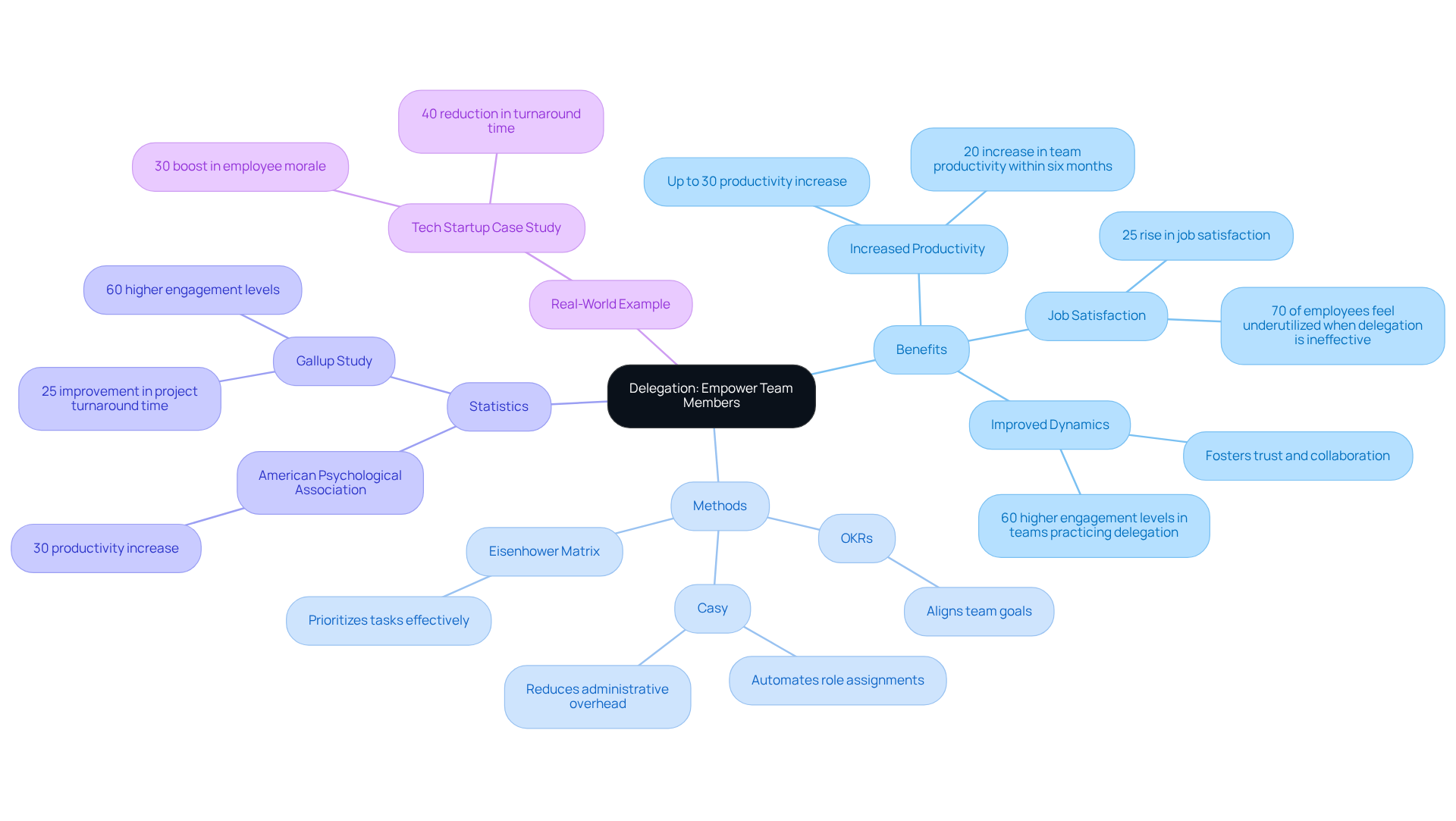
Feedback Loops: Learn and Improve Throughout the Process
Feedback loops are essential for fostering continuous learning and improvement throughout the lifecycle. By consistently collecting feedback from group members and stakeholders, organizations can pinpoint areas needing enhancement and implement necessary changes. For example, the RANI Project effectively integrated feedback loops into its process evaluation, enabling timely adaptations that significantly improved intervention delivery and responsiveness to community needs. Likewise, companies like Uber and Airbnb illustrate how feedback loops can enhance service delivery and operational efficiency.
Current trends indicate that organizations employing feedback mechanisms experience a significant increase in success rates. Research shows that groups with well-defined feedback processes can boost performance by up to 30%, highlighting the critical role of feedback loops in achieving these results. Furthermore, studies reveal that organizations engaged in regular feedback collection report a 30% higher rate of customer satisfaction, underscoring the importance of these loops in driving positive outcomes.
Casy plays a pivotal role in facilitating this process by automatically capturing feedback and integrating it into updates. This ensures that groups remain agile and responsive to insights and recommendations, ultimately leading to improved outcomes. As emphasized by industry leaders, fostering a culture of feedback not only enhances group dynamics but also drives innovation and success in project management.
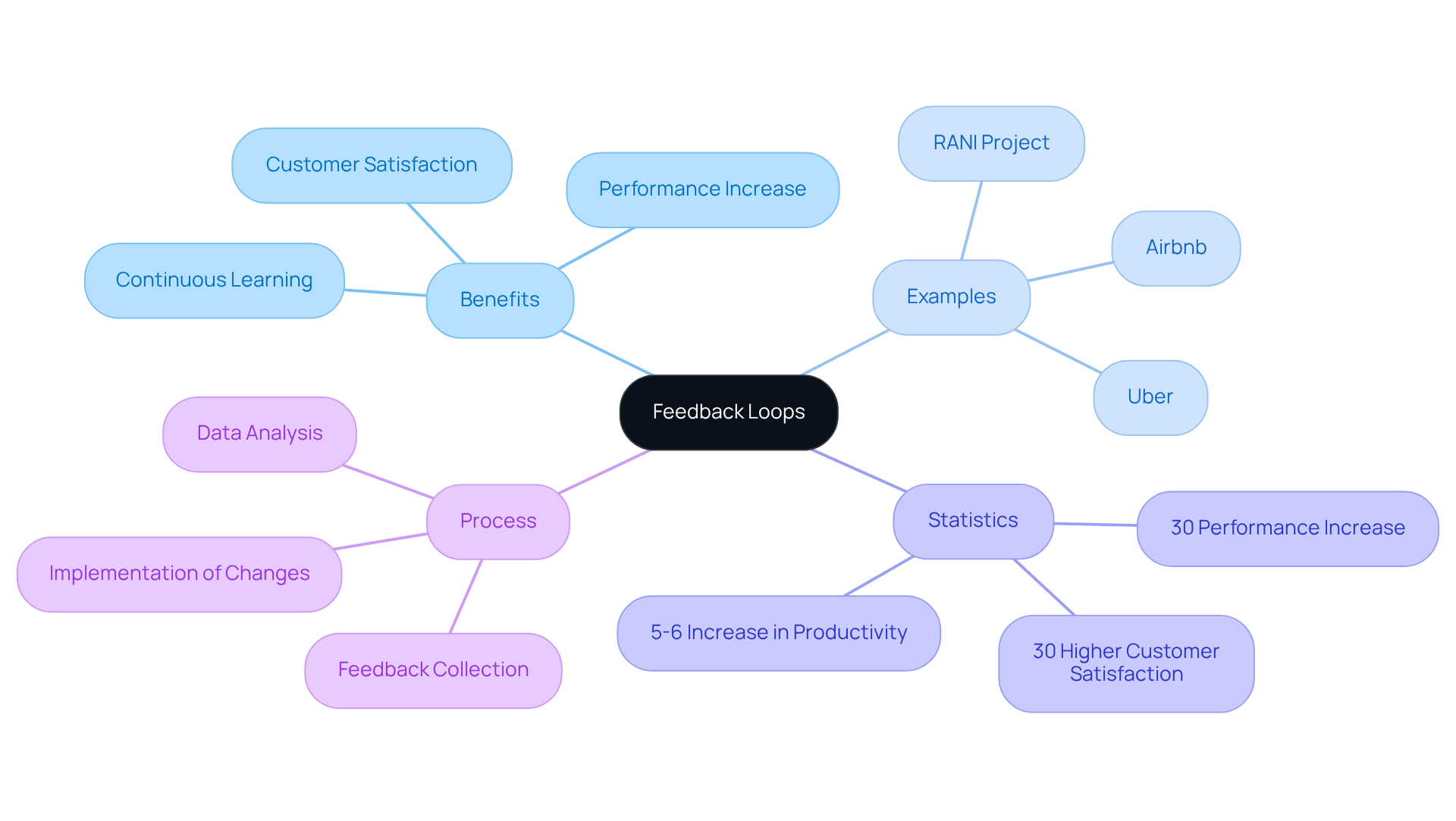
Deadlines: Create Urgency to Drive Progress
Setting clear deadlines is crucial for fostering progress and maintaining momentum within teams. Deadlines create a sense of urgency that propels group members to prioritize their tasks, as tasks are required activities that need to take place in order to complete a goal, and remain focused on their objectives.
Have you considered how deadlines can transform your team's productivity? Casy's automated reminders and deadline tracking features not only help teams stay accountable but also ensure that projects are completed on time. This proactive approach to deadline management emphasizes that tasks are required activities that need to take place in order to complete a goal, which can significantly enhance your team's efficiency and success.
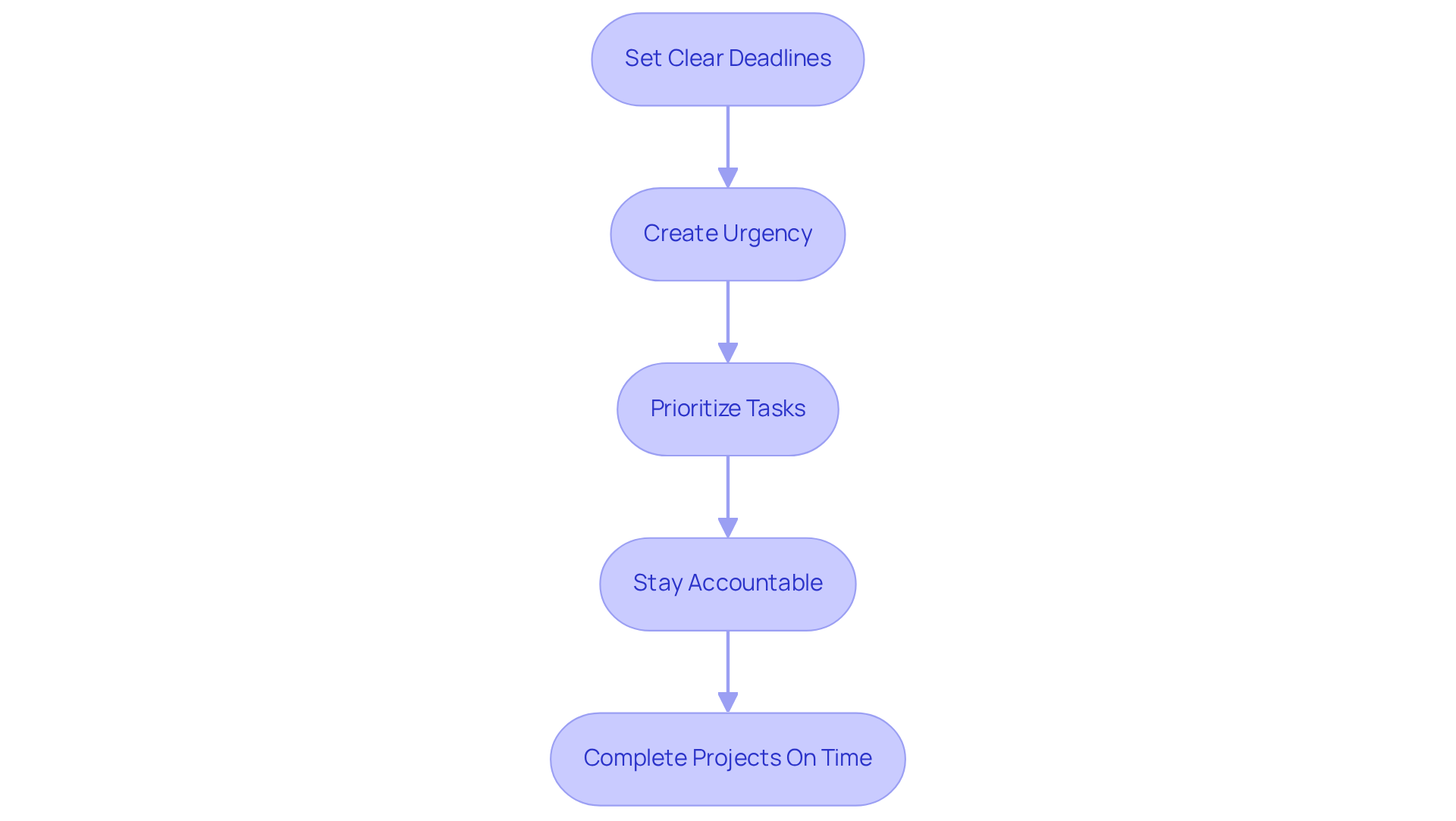
Milestone Celebrations: Recognize Achievements to Motivate Teams
Acknowledging and commemorating milestones is crucial for maintaining group motivation and morale. But how often do we truly celebrate our successes? Celebrations can range from simple acknowledgments to organized group events, each playing a vital role in fostering a positive work environment. Research from the Achievers Engagement and Retention Report indicates that 94% of employees who receive daily recognition report satisfaction with their work. This statistic underscores the importance of consistent appreciation.
Utilizing Casy to monitor milestones and achievements allows groups to ensure that successes are celebrated. This approach reinforces a culture of recognition that not only acknowledges individual contributions but also drives collective productivity. In fact, organizations with structured recognition programs, as noted by SHRM Globoforce, experience 31% lower voluntary turnover. This highlights the effectiveness of recognition in retaining talent.
Yet, research indicates that merely 35% of groups acknowledge accomplishments regularly. This statistic points to a significant gap in recognition practices, emphasizing the necessity for more consistent efforts. Implementing regular milestone celebrations can significantly enhance team dynamics. How might your team benefit from aligning their efforts with organizational goals while striving for excellence? By fostering a culture of recognition, we can motivate members to achieve greater heights.
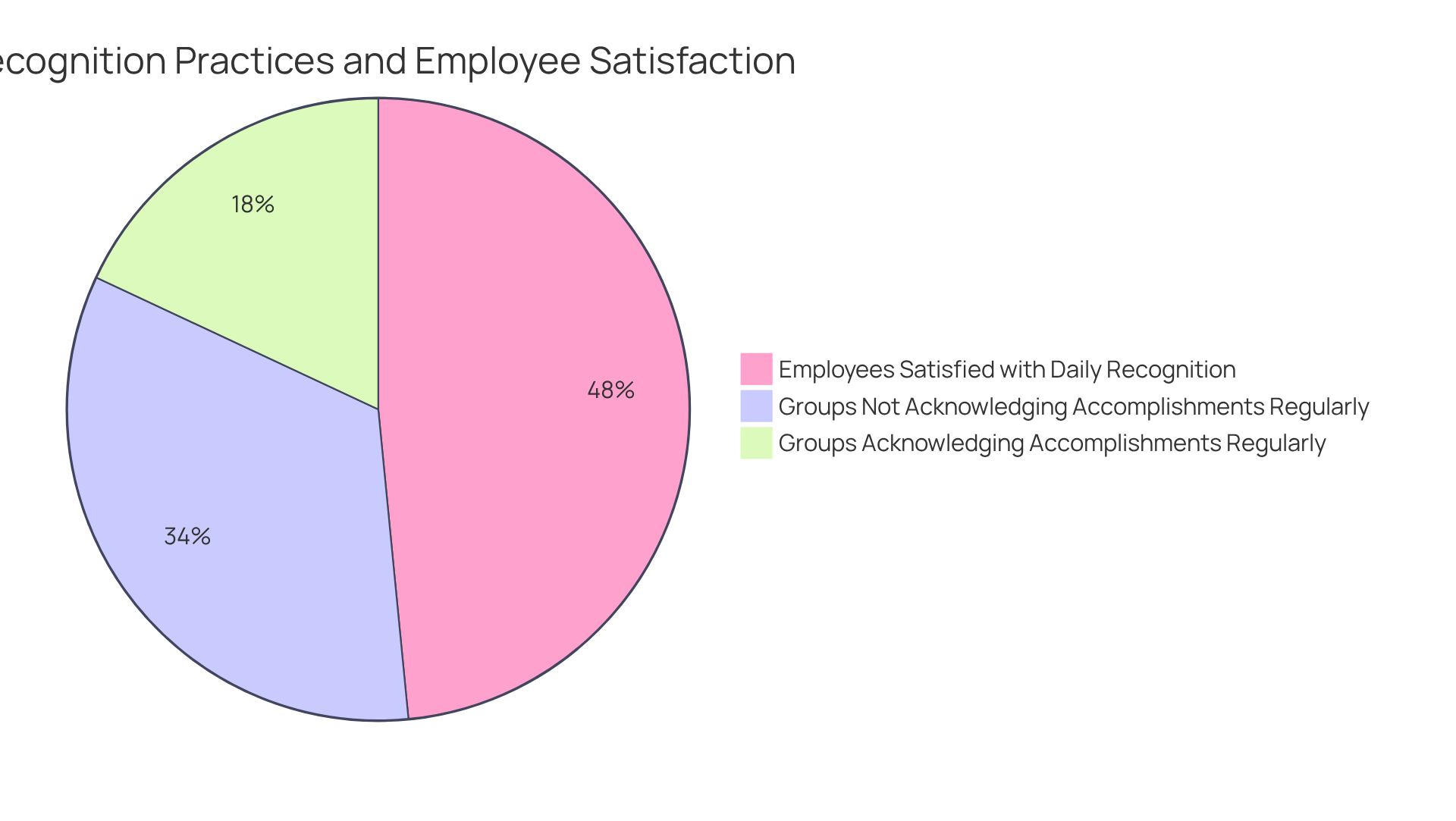
Conclusion
The journey toward achieving goals is intricately linked to the execution of essential tasks that drive success. By understanding and implementing key activities—such as effective task management, SMART goal setting, and agile methodologies—teams can significantly enhance their productivity and adaptability. The integration of tools like Casy automates these processes, ensuring that critical tasks are tracked and completed efficiently, ultimately leading to goal accomplishment.
Throughout this article, various strategies have been explored, including the importance of:
- Progress tracking
- Task prioritization
- Fostering team communication
By emphasizing the need for delegation and feedback loops, it becomes evident that a collaborative environment is paramount for driving performance. Celebrating milestones not only motivates teams but also reinforces a culture of recognition that is vital for long-term success.
In conclusion, embracing these structured approaches to task management is not merely a recommendation; it is a necessity for any team striving for excellence. By utilizing automation, fostering clear communication, and recognizing achievements, organizations can create a dynamic and productive work environment. The time to implement these strategies is now—transform the way your team operates and propel them toward their goals with confidence and clarity.
Frequently Asked Questions
What is Casy and how does it function?
Casy is an automated task management tool that integrates with chat platforms like Slack and Telegram. It captures key information from conversations and transforms discussions into actionable tasks, setting deadlines and updating documents without manual input.
What are the benefits of using Casy for teams?
Casy reduces administrative overhead, allowing teams to focus on core activities, enhance productivity, and achieve objectives more effectively while minimizing the risk of miscommunication.
How does Casy support productivity in the context of generative AI?
With generative AI projected to contribute significantly to productivity, Casy's support for unlimited teams and tasks, along with methodologies like OKRs, positions it as a valuable tool for modern management challenges.
What are SMART goals and why are they important?
SMART goals are objectives that are Specific, Measurable, Achievable, Relevant, and Time-bound. They provide clarity and direction, helping teams understand their objectives and align their efforts toward measurable outcomes.
Can you provide examples of SMART goals?
Examples of SMART goals include reducing project completion time from three minutes to one minute by the end of the upcoming quarter, and enhancing customer satisfaction ratings by 10% in the next quarter.
How does progress tracking contribute to effective project management?
Progress tracking involves establishing milestones as checkpoints throughout a project. It allows teams to assess their progress and make informed adjustments to stay on course.
What role does Casy play in progress tracking?
Casy automates progress tracking by providing real-time updates and insights into project status, which helps teams remain focused and agile in their tasks.
What practices can teams implement to maximize the benefits of milestone tracking?
Teams should implement regular review intervals and utilize automation tools like Casy to streamline their processes and enhance accountability and continuous improvement.




